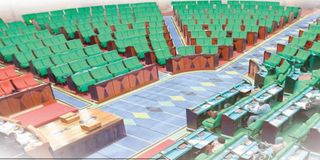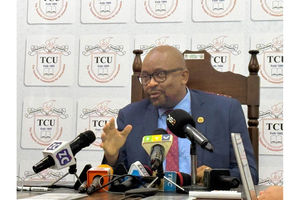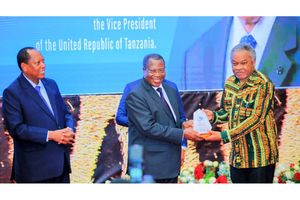Questions swirl as new Bunge holds first sitting

What you need to know:
- For the first time in 25 years, Tanzania will have a parliament where one party – CCM – commands over nearly 97 percent of the elective seats.
Dar es Salaam. A parliament that is like no other in the political pluralism era in Tanzania convenes for the first time today.
The 12th Parliament of the United Republic of Tanzania commences business against a backdrop of numbers that have not been seen since the country held its first multiparty elections in 1995 following statutory restoration of competitive politics in 1992.
For the first time in 25 years, Tanzania will have a parliament where one party – CCM – commands over nearly 97 percent of the elective seats.
While the ruling party could see its October 28 victory as signaling the support it commands irrespective of cries of ballot boxes stuffing and widespread irregularities from the opposition, the unshaken fact is that Parliament will have to tweak the way it does business to align with the new realties that predominantly resemble those in a mono party system.
So far, only two opposition politicians were declared victors during the 2020 General Election in Tanzania Mainland. They are: Ms Aida Khenan (Nkasi North - Chadema) and Shemsia Mtamba (Mtwara Rural - CUF). CUF also won two more seats in Pemba while ACT-Wazalendo’s four candidates were declared victors. This makes a total of only eight elected opposition MPs in a country of 264 elective parliamentary constituencies.
Chadema has the right to nominate 19 Special Seats MPs who are selected base on the total number of votes garnered by the party’s parliamentary contestants. CCM gets a total of 95 special seats MPs to expand its parliament’s ownership to 351. This would bring the total number of opposition MPs in the House to 27. This would still fall short of the 12.5 percent weighting that is required for opposition parties to form the ‘official opposition’ in Parliament, in line with the 2016 Parliamentary Standing Orders. The number should have gone up to 49 for the Order to apply.
Moreover, ACT-Wazalendo says it does not recognize the election outcomes - and, as such, its politicians, who were declared victors, will not go to Parliament. Likewise, Chadema had until yesterday not submitted the names of its 19 Special Seats MPs as required because, like ACT, the party says it does not recognize the 2020 election results. With time ticking away, the 12th Parliament may start with only about two or four opposition MPs.
Watchdog committees
According to Parliamentary Standing Orders, which are aligned with the practice across all countries under the Commonwealth, oversight committees that directly look into public monies like the Public Accounts Committee (PAC) and the Local Authorities Accounts Committee are to be chaired by opposition MPs. The latter scrutinise councils’ financial reports that have been audited by the Government Controller and Auditor General (CAG) and advises the government on the right steps to take against those who may have been implicated in the audit reports.
The former is basically Parliament’s watchdog entity which scrutinizes the CAG’s audit reports on operations of the central government and its agencies, institutions or departments.
The committees also make close follow ups on its past recommendations to the audited entities.
Even though the two or more MPs from the opposition may simply be elected to head the two powerful committees, their efficacy remains everybody’s question because almost all of the committee members will be from the ruling party.
A new thing
During the 11th Parliament which came into power after the 2015 General Election, there were a total of 392 MPs, grouped as 287 for CCM, 63 for Chadema, 39 for CUF. ACT-Wazalando and NCCR-Mageuzi each had one MP plus the Attorney General, an ex-officio MP. That gave the opposition a 26.5 percent command: more than enough of what was required to form the opposition bench.
The 10th Parliament, which came to power after the 2010 General Election, had a total of 357 seats. The number included 239 directly contested parliamentary constituencies, Special Seats MPs and nominated ones.
Of the elected MPs, CCM had a total of 186 while the opposition had a total of 53 seats. Out of opposition seats, CUF had 24 while Chadema had 23. NCCR-Mageuzi had four while Tanzania Labour Party (TLP) and United Democratic Party (UDP) had one each.
This meant that together, the opposition held 14.8 percent of the total number of MPs which were enough for it to form the opposition bench.
In the ninth Parliament which came to office in after the 2005 General Election, the country had a total of 317 seats whereby the opposition held 46 seats that gave it a 14.5 percent command. The number was enough for it to form an opposition bench. Of the 46 opposition MPs, CUF had 32, Chadema had 12 while TLP and UDP had one each.
In the second elections under the multiparty system which was held on October 29, 2000, CCM clinched 202 of the 231 seats in the National Assembly. That gave the opposition a 12.5 percent control though after the election, 48 additional seats for women MPs were awarded to the parties based on the proportion of seats in the National Assembly, whilst five members were elected by the House of Representatives of Zanzibar. President Benjamin Mkapa nominated ten members, while the Attorney General was an ex-officio member, giving a total number of MPs of 285.
The first General Election under the reinstated multiparty system was held in Tanzania on October 29, 1995 where CCM won 186 of the 232 constituencies. That gave the opposition a 19.8 percent control of the House, basing on the number of elected MPs.
After the election, 37 additional seats for women MPs were awarded to the parties based on the proportion of seats in the National Assembly, while five members were elected by the House of Representatives of Zanzibar as President Mkapa also nominated ten more. Inclusive of the Attorney General, there were a total of 285 MPs in the National Assembly in 1995.
By press time yesterday, it was only Ms Khenan and Ms Mtamba who had registered at Parliament House in the new national capital Dodoma.





